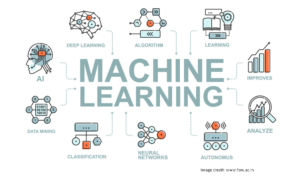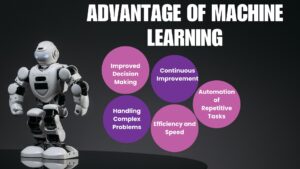Introduction To Machine Learning

Image Credit: https://www.collegelib.com/what-is-machine-learning/
Machine Learning, a term introduced by Arthur Samuel in 1959, focuses on algorithms and data, much like how humans improve their skills through continuous practice. Unlike general Artificial Intelligence and computer science, Machine Learning is dedicated to enhancing accuracy through learning from data. Samuel, an IBM employee with expertise in AI and computer science, emphasized this distinct approach. Essentially, Machine Learning serves as a tool for problem-solving and automation in various tasks and business processes, becoming crucial in data science. Mathematician Alan Turing argued that debating whether machines can think is futile. He suggested a game where participants have written conversations with both a machine and a human to distinguish between the two, thereby testing AI. Our daily lives are deeply intertwined with Machine Learning, making them significantly more efficient and manageable.
Machine Learning allows computers to make decisions and identify patterns on their own, without being programmed for each specific task. While the idea of machine learning has been around for a long time, it has only recently become widely popular. Machine Learning is a field of artificial intelligence that focuses on the development of algorithms and models that enable computers to learn and make decisions from data.
Advantage Of Machine Learning

♦ Improved Decision Making
By analyzing large datasets, machine learning algorithms offer insights and predictions that enhance decision-making processes. Machine learning greatly improves decision-making by utilizing extensive datasets and advanced algorithms. By analyzing past data, these models can predict future trends with accuracy. This capability allows businesses to forecast demand, manage their inventory, and plan more effectively. Additionally, machine learning systems can analyze data in real-time, offering instant insights and facilitating quick decisions, which is crucial in fast-changing environments. Incorporating machine learning into their decision-making processes enables organizations to enhance their results, streamline operations, and stay competitive in their industries.
♦ Continuous Improvement
Machine learning models can evolve and improve over time as they process more data, leading to increasingly accurate predictions and decisions. A key benefit of machine learning is its capacity for ongoing enhancement. As models encounter more data, they can adjust and perfect their algorithms, resulting in steadily improved performance. This cycle of learning allows organizations to consistently upgrade their decision-making processes. By tapping into this strength, companies can boost prediction accuracy, streamline operations, and stay ahead of new trends and challenges. Continuous improvement through machine learning ensures systems stay pertinent and efficient, ultimately fostering long-term success and innovation.
♦ Automation of Repetitive Tasks
It can take over repetitive, time-consuming tasks, allowing humans to focus on more complex activities. Machine learning greatly benefits the automation of repetitive tasks. By using sophisticated algorithms, machine learning systems can manage routine tasks without needing human input. This approach not only conserves time and minimizes mistakes but also allows human workers to concentrate on more complex and innovative projects. Automating tasks with machine learning boosts productivity, maintains consistency, and can significantly reduce costs for companies. In the end, this advantage enables businesses to function more efficiently and effectively.
♦ Efficiency and Speed
Algorithms can process and analyze data much faster than humans, resulting in quicker insights and actions. Machine learning greatly boosts efficiency and speed across numerous processes. By automating repetitive tasks and optimizing complex operations, ML algorithms manage large data sets and complete tasks more swiftly than humans can. This results in faster decision-making and quick adaptation to new information. Moreover, ML systems continuously learn and enhance their performance over time, further increasing their efficiency. These speed and efficiency benefits of ML ultimately lead to lower operational costs, higher productivity, and a competitive advantage for businesses.
♦ Handling Complex Problems
It can tackle problems too complex for traditional programming, such as natural language processing and image recognition. Machine learning shines when it comes to solving intricate problems that traditional methods struggle with. By using advanced algorithms and large datasets, ML systems can identify complex patterns and relationships that humans would likely miss. This capability enables ML to tackle sophisticated challenges in fields like predictive analytics, natural language processing, and image recognition. As a result, ML offers crucial insights and solutions, becoming an essential tool for addressing complex issues across various domains.
Disadvantage Of Machine Learning
♦ High Costs
Developing and maintaining these models can be expensive, needing significant computational resources and expertise. The considerable expenses linked with machine learning present a major drawback. Setting up ML systems necessitates a significant investment in infrastructure, computing power, and talented personnel. These expenditures encompass acquiring and managing extensive datasets, creating and refining intricate algorithms, and continually updating hardware and software to stay current with advancements. Moreover, training and retraining models require substantial time and specialized knowledge. These costs may prove daunting for smaller entities or those lacking extensive financial resources, constraining their capacity to utilize ML effectively.
♦ Security and Privacy Concerns
These systems can be vulnerable to attacks, and managing large amounts of data raises privacy issues. Security and privacy are major concerns associated with machine learning. The intricate nature of machine learning systems, coupled with the enormous volumes of data they handle, can create opportunities for exploitation by malicious individuals. Concerns include potential data breaches, unauthorized access, and the misuse of personal information, all of which present significant risks. Moreover, adhering to regulatory standards such as GDPR or HIPAA imposes additional layers of complexity and expense on the implementation of machine learning solutions. These challenges can erode confidence in machine learning technologies and impede their adoption, especially within sensitive sectors such as healthcare and finance.
♦ Data Dependency
Effective training of machine learning models requires large amounts of data, which can be a limitation for certain applications. Machine learning encounters a major hurdle because it relies heavily on data. The ability to train effectively and make precise predictions largely depends on having access to vast, high-quality datasets.
Conclusion
In conclusion, delving into the realm of machine learning reveals its profound impact on diverse fields. As we navigate its complexities and potentials, one thing remains clear: the future holds endless possibilities driven by this transformative technology. Embracing its evolution promises to reshape industries, enhance efficiencies, and pave the way for innovative breakthroughs that define tomorrow’s advancements.











